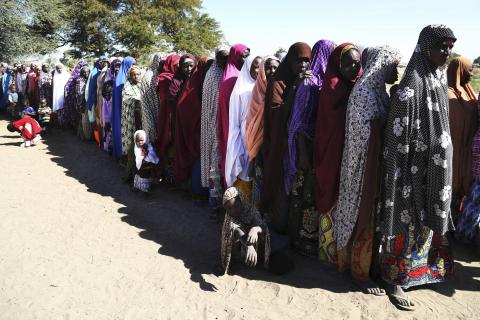Advertisement
Niger lifts refugee camp ban as record numbers flee Boko Haram: TRFN
DAKAR (Reuters) - The Niger government has lifted a ban on refugee camps in the south of the country as record numbers flee Boko Haram attacks in neighbouring Nigeria.
The government had banned the camps fearing Boko Haram fighters might use them as bases to launch attacks in Niger and Nigeria as part of their drive to carve out an Islamic caliphate.
But a Niger government official said communities in Niger's Diffa region had been overwhelmed by new arrivals, prompting the government to reverse the two-year-old policy, a move welcomed by the United Nations.
"We hoped the displacement would stop, but people continue to arrive, and our villages and towns can no longer absorb the masses of people coming," Hassane Ardo Ido, general-secretary of Diffa province, told the Reuters.
According to government figures, some 150,000 refugees as well as returning Niger migrants are seeking shelter amongst locals in Diffa, an impoverished region recovering from drought.
The shift in policy follows months of lobbying by the United Nations' refugee agency (UNHCR), which argued that the camps could provide protection, shelter and food for the refugees without burdening the host population.
Karl Steinacker, UNHCR's country director in Niger, told the Thomson Reuters Foundation by telephone from Niamey the country had never seen this many Nigerian refugees before.
UNHCR had opened one camp in Sayam Forage, 25 km (15 miles)north of Diffa, and was constructing another in Kablewa, further north. But convincing refugees to relocate was proving difficult, he said.
"Only 600 have been moved into the camp since it opened on Dec. 30," said Steinacker.
Niger launched a $36 million emergency plan to cater for the refugees earlier this month and has asked for international humanitarian assistance.
Boko Haram has killed thousands in a five-year rebellion. The number and scale of militant attacks have risen sharply since May 2013 when President Goodluck Jonathanimposed emergency rule in Nigeria's three worst-hit northern states bordering Niger.
Antonio Avella, deputy country director for the World Food Programme (WFP) in Niger said the organisation had to reallocate funds from other programmes to deal with the Nigeria crisis in 2014 and was struggling to secure funds for 2015.
In October 2014 Nigeria, Niger, Chad and Cameroon agreed in Niamey to coordinate a military response to the fight against Boko Haram, but the deal is all but dead, according to sources at the United Nations.



















Add new comment